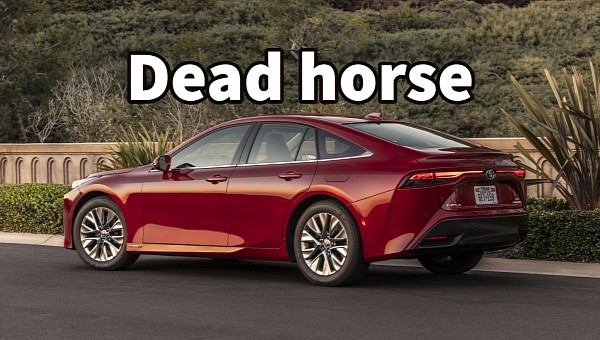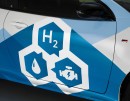The Japanese carmakers are still reluctant to prioritize electric vehicles, with Toyota insisting that hydrogen might be a better solution. The industry may have made its choice, though, as electric cars gain speed and the charging infrastructure expands at a neck-breaking pace.
Toyota has one of the more confusing strategies in the automotive industry. Its pledge to develop dozens of new EV models alternates with statements about the combustion engine still having a future. Akio Toyoda announced Koji Sato as his successor starting on April 1, and we thought the Japanese carmaker finally understood the importance of stepping up EV development. Sato revealed plans for a new dedicated EV platform to replace the ailing e-TNGA. But he also said he doesn’t want to rule out other propulsion systems, namely hydrogen ICE and fuel cells.
Sato reiterated that hydrogen remains a “viable option” for Toyota, and the carmaker is willing to invest heavily in advancing the development of a hydrogen combustion engine. Hilariously, Sato made this statement on the sidelines of a weekend endurance race where Toyota could not enter its hydrogen-powered Corolla. The car burnt to the ground weeks before the race because of a hydrogen line leak, and the carmaker could not rebuild it in time for the race.
Like Toyoda before him, Sato also appeared to prioritize electric vehicles. After he was named Toyota’s CEO last month, Sato boasted about the need to drastically change the company and adopt an EV-first strategy. Now, he backpedals and wants to give hydrogen another try. According to Sato, hydrogen will play a critical role in Toyota’s multi-pronged approach to achieving carbon neutrality.
Thanks to the Mirai, Toyota was one of the pioneers of hydrogen fuel-cell propulsion systems. The second generation of the FCV was released in 2020, and Toyota announced bold plans to build up to 30,000 units per year. The reality check was brutal, with only 21,600 units sold since sales of the first generation began in December 2014.
Other carmakers have launched dozens of new EV models, meaning customers have many options when shopping for an electric car. At the same time, only two hydrogen fuel cell models are available in the U.S.: the Mirai and the Hyundai NEXO Fuel Cell. Honda intends to offer a fuel-cell-powered CR-V in 2024. This shows that hydrogen will face an uphill battle to surpass EVs. There are few advantages for hydrogen-fueled cars compared to their EV rivals.
Analysts believe (reading requires subscription) the ship has sailed regarding hydrogen, and the infrastructure plays an outsized role. There are nearly 51,000 EV charging stations in the U.S., with more than 130,000 charge ports, not counting home chargers. Investments fueled by government incentives will expand this even further. At the same time, only 55 hydrogen fuel stations exist, according to the Department of Energy. Building new hydrogen stations is expensive, and the fuel itself is not cheap, especially when generated sustainably.
Sato reiterated that hydrogen remains a “viable option” for Toyota, and the carmaker is willing to invest heavily in advancing the development of a hydrogen combustion engine. Hilariously, Sato made this statement on the sidelines of a weekend endurance race where Toyota could not enter its hydrogen-powered Corolla. The car burnt to the ground weeks before the race because of a hydrogen line leak, and the carmaker could not rebuild it in time for the race.
Like Toyoda before him, Sato also appeared to prioritize electric vehicles. After he was named Toyota’s CEO last month, Sato boasted about the need to drastically change the company and adopt an EV-first strategy. Now, he backpedals and wants to give hydrogen another try. According to Sato, hydrogen will play a critical role in Toyota’s multi-pronged approach to achieving carbon neutrality.
Thanks to the Mirai, Toyota was one of the pioneers of hydrogen fuel-cell propulsion systems. The second generation of the FCV was released in 2020, and Toyota announced bold plans to build up to 30,000 units per year. The reality check was brutal, with only 21,600 units sold since sales of the first generation began in December 2014.
Other carmakers have launched dozens of new EV models, meaning customers have many options when shopping for an electric car. At the same time, only two hydrogen fuel cell models are available in the U.S.: the Mirai and the Hyundai NEXO Fuel Cell. Honda intends to offer a fuel-cell-powered CR-V in 2024. This shows that hydrogen will face an uphill battle to surpass EVs. There are few advantages for hydrogen-fueled cars compared to their EV rivals.
Analysts believe (reading requires subscription) the ship has sailed regarding hydrogen, and the infrastructure plays an outsized role. There are nearly 51,000 EV charging stations in the U.S., with more than 130,000 charge ports, not counting home chargers. Investments fueled by government incentives will expand this even further. At the same time, only 55 hydrogen fuel stations exist, according to the Department of Energy. Building new hydrogen stations is expensive, and the fuel itself is not cheap, especially when generated sustainably.






